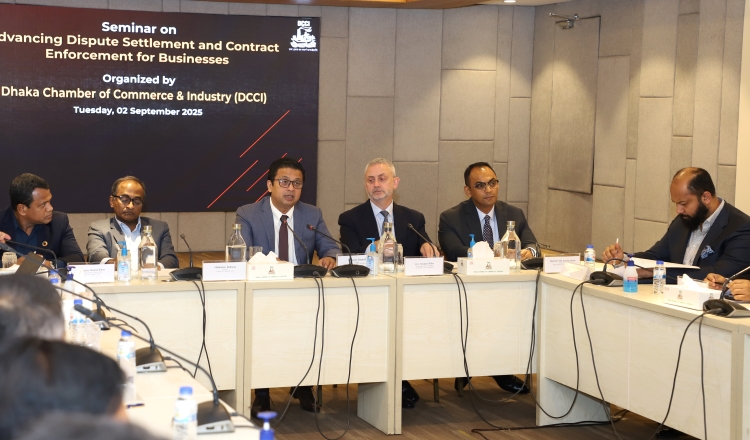News Flash
News Flash

DHAKA, Sept 2, 2025 (BSS) - Experts at a seminar here today laid emphasis on
resolving trade-related disputes outside traditional courts for reducing
overwhelming pressure on the judiciary substantially and improving the
overall business climate.
They observed that as Bangladesh is one of the most densely populated
countries, the number of cases in courts is increasing every day, making
judicial delays intolerable and this situation is hampering both domestic and
foreign investment as well as commercial activities.
They made the observation at the seminar on "Advancing Dispute Settlement and
Contract Enforcement for Businesses" held at the Dhaka Chamber of Commerce
and Industry (DCCI) in the capital city.
Mahbubur Rahman, secretary of Ministry of Commerce, graced the seminar as the
chief guest while Michael Miller, ambassador and head of delegation of the
European Union (EU) in Bangladesh, and Md Abdur Rahim Khan, additional
secretary (Export Wing) of Ministry of Commerce and Vice-Chairman of Export
Promotion Bureau (EPB) (Additional Charge) attended as special guests.
Mahbubur Rahman pointed out that despite the introduction of the Arbitration
Act in 2001, a business-friendly environment has not been fully ensured.
He underscored the importance of raising awareness and promoting countrywide
arbitration.
He also informed that the process of establishing a Commercial Court is
ongoing, and he hoped that the draft will be finalized within a month.
Michael Miller said that in order to reform the legal process, the EU has
been working closely with the government.
He expressed that the reform of the legal system will significantly improve
the public's quality of life.
"As Bangladesh moves toward LDC graduation and pursues export
diversification, the formation of Commercial Courts will be crucial to
attract foreign investment. Such courts will facilitate both domestic and
foreign investment expansion," the envoy noted.
He hoped that the government would prioritize this issue for the greater
interest of the economy.
Michael Miller further stated that strengthening arbitration mechanisms will
help reduce the current investment stagnation.
He also added that European companies are keen to invest in Bangladesh's
logistics and shipping sectors.
Md. Abdur Rahim Khan said that delays in resolving trade disputes not only
hinder FDI attraction but also negatively impact export expansion.
"Besides, due to this, Bangladesh is gradually losing its place in global
trade," he added.
To overcome this, he proposed forming "legal institutions" outside
traditional courts to resolve disputes through negotiations in a
comparatively shorter time.
In his welcome remarks, DCCI President Taskeen Ahmed stated that as economic
activities in the country are growing significantly, disputes related to
business contracts, investments, and intellectual property are also
increasing.
Currently, around four million cases remain unresolved in lower and higher
courts of Bangladesh, he added.
He mentioned that prolonged judicial processes are hampering both local as
well as foreign investment.
Although, the Arbitration Act was in 2001, it has not been implemented
effectively, he added.
Taskeen Ahmed stressed the need for establishing a separate Commercial Court
with the appointment of experienced judges and reforming the existing legal
framework which will accelerate the pace of trade and investment.
Barrister Md. Sameer Sattar, former President of DCCI, presented the keynote
paper. In his presentation, he said contract enforcement is a crucial
determinant for both local and foreign investors, but Bangladesh is lagging
far behind in this regard.
He mentioned that Bangladesh ranked 189th out of 190 countries in contract
enforcement as per the earlier World Bank's Doing Business Report.
The DCCI former head highlighted that as of March 2025, nearly 25,000 cases
are pending in financial loan courts, clearly reflecting the lengthy legal
processes.
He strongly urged prioritizing the necessary amendment of the Arbitration Act
2001.
Md. Ariful Haque, director general of Bangladesh Investment Development
Authority (BIDA), stressed that enacting laws alone is not sufficient to
change the existing system rather institutional reforms are also crucial.
KAM Majedur Rahman, chief executive officer (CEO) of Bangladesh International
Arbitration Centre (BIAC) said that delays in trade dispute resolution have
become a matter of serious concern.
Vikna Rajah, Co-Head of South Asia Desk, Rajah and Tann, Singapore
highlighted that due to strong legal structures, skilled human resources,
strict law enforcement, and robust commercial dispute settlement mechanisms,
Singapore continues to attract high levels of foreign investment.
He stressed the need for comprehensive legal reforms, establishment of
specialized commercial courts, and revision of the Arbitration Act in
Bangladesh to attract more foreign investment.
Judge Tareque Muajjem Hussain, special officer (Additional District Judge),
to the Chief Justice (CJ) of Bangladesh, stressed the need for appointing
experienced judges specialized in commercial disputes along with proper
training which will ensure smooth and faster dispute resolution.
In the open floor discussion, Rizwan Rahman, former President, DCCI said that
lack of inter-ministerial coordination is one of the major barriers resolving
trade disputes.
He expressed concern that if this situation does not change both domestic and
foreign investment will remain stagnant.
He also urged for reliance on arbitration centers rather than traditional
courts to resolve commercial disputes.
DCCI Vice-President Md. Salem Sulaiman, members of the Board of Directors,
and stakeholders from relevant sectors were also present at the event.